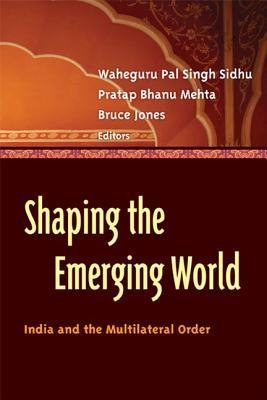Product desciption
Shaping The Emerging World India And The Multilateral Order Waheguru Pal Singh Sidhu Pratap Bhanu Mehta Bruce Jones by Waheguru Pal Singh Sidhu; Pratap Bhanu Mehta; Bruce Jones 9780815725145, 0815725140 instant download after payment.
India faces a defining period. Its status as a global power is not only recognized but increasingly institutionalized, even as geopolitical shifts create simultaneous opportunities and challenges. India experienced rapid growth through participation in the existing multilateral order --now its development strategy makes it dependent on this order. With critical interests in almost every major multilateral regime and vital stakes in several emerging ones, India might have no choice but to influence the evolving multilateral order if it is to sustain its own interests.
If India seeks to influence the multilateral order, how will it do so? Will it be content with rule taking --adhering to international norms and institutions? Will it focus on rule breaking --challenging the existing order primarily for effect and seeking greater accommodation in existing global institutions? Or will it focus on rule shaping --contributing in partnership with others to emerging norms and regimes, particularly on climate, maritime security, and cyber security? And how much do India's troubled neighborhood and complex domestic politics inhibit its rule-shaping ability?
These questions play out both within India's broadening global neighborhood and in specific issue areas. This volume provides a comprehensive and detailed analysis of India's new approach to multilateralism and the factors that are likely to determine this approach.
Contributors include Kanti Bajpai (National University of Singapore), Sandeep Bharadwaj (Centre for Policy Research, New Delhi), Sanjaya Baru (International Institute for Strategic Studies), Navroz Dubash (Centre for Policy Research), Arunabha Ghosh (Council on Energy, Environment and Water, New Delhi), Richard Gowan (New York University Center on International Cooperation), Christophe Jafferlot (Centre d'?tudes et de recherches internationales and Centre national de la recherche scientifique), Devesh Kapur (University of Pennsylvania), Tanvi Madan (Brookings Institution), C. Raja Mohan (Observer Research Foundation, New Delhi), David Malone (rector of United Nations University, Tokyo), Rohan Mukherjee (Princeton University), Nitin Pai (Takshashila Institution, India), Srinath Raghavan (Centre for Policy Research), Rajesh Rajagopalan (Jawaharlal Nehru University), Iskander Rehman (Carnegie Endowment for International Peace), Shyam Saran (National Security Advisory Board and Research in Information Systems for Developing Countries), Sushant Kumar Singh (Takshashila Institution), and David Steven (NYU Center on International Cooperation).


